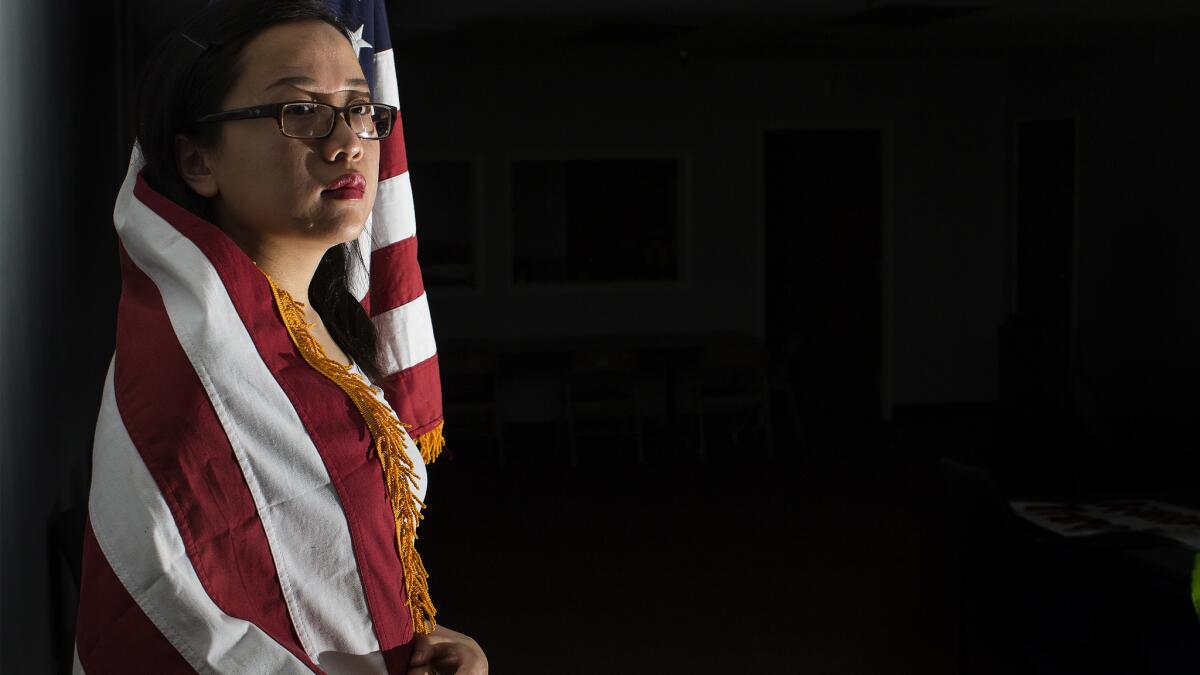Immigrantsâ visas expire but many remain, despite repercussions

Diana Wong, 26, was brought to the United States when she was 5 by her parents to get a better education. âAmerica is home now, and it has been since I arrived. Thereâs no going back,â she said. She was born in Mexico after her parents moved there from China.
Laura Lopez first came to the U.S. at 15. She had joined a group of students from Guatemala who were visiting Orange County.
She remembers her first trip to Disneyland, eating at Taco Bell and strolling through the streets of downtown Santa Ana, with its impressive red sandstone courthouse.
âI felt so much energy,â said Lopez, now 30. âI looked around and saw that courthouse, and it was like something that spoke about freedom. I just didnât want to leave.â
Lopez returned to Santa Ana two years later on a tourist visa. This time, she never left.
Billy Lee came to California from South Korea with his mother when he was 5. Their trip included exploring Hollywood and spending time with relatives. âThey told my mother they had great jobs, great schools â that this was a wonderful, open place to live and that we should take a risk and copy them,â said Lee, now 31.
So they stayed.
Lee and Lopez are among millions of immigrants who came to the United States with legal visas, and remained once those visas expired. Homeland Security Department officials estimate that up to 40% of the roughly 11 million people in the U.S. illegally arrived this way.
âAt some point in their journey, they either ⌠found work, found husbands or wives or some canât-miss opportunity, and they decided to let their paperwork expire,â said Jorge-Mario Cabrera, spokesman for the Coalition for Humane Immigrant Rights of Los Angeles. âIt happens all the time.â
Yet, he said, no system exists âto follow up on what these folks do once theyâre in the States. Thereâs no process by which officials can track if someone stayed the proper amount of time or beyond that.â
Last week, two Vietnamese girls â Ly Camly Vuong, 12, and Linh Huyen Cao, 17 â made headlines after they left their tour group at Los Angeles International Airport. When detectives found the pair staying with family friends in Westminster, they contacted the girlsâ parents â who said they had known of the plan.
Police said no one would be charged in the incident and noted that the girls have tourist visas that are effective for several weeks. Many in the community continue to speculate about the girlsâ motives.
âEconomics, of course, compels people to escape like nothing else can,â Cabrera said. âBut you have to understand that America is still that beacon of hope. They donât think that all their dreams will come true. But they know they will not be as mistreated, they will not be as persecuted or as poor. There is so much here that they associate with the word âpossible.ââ
They continue even though the pursuit of that dream can bring repercussions, such as separation from loved ones or hostility felt in a new land.
Diana Wong and her mother came to Southern California on tourist visas in 1995, when she was 6. Her mother decided they should stay, so Diana and her brother, who had been sent to the U.S. months earlier, could get a good education.
The family had been living in Hermosillo, Mexico, where Wongâs parents worked 12-hour days, every day, after moving from Guangzhou, China.
âIn their lives, they never owned property. My dad is a kitchen hand, and my mom is a domestic worker, still. You have to look to your kids for what good might happen,â Wong said.
The Wongs now live in Monterey Park, lacking legal status. âWe have to battle â battle against how people feel about immigrants,â the 26-year-old anthropology major at UC Santa Cruz said. âThey donât like immigrants.â
The Vietnamese runaways unleashed a storm on Facebook, with posts asking how authorities planned to find âthe fugitives.â
Sahar Zabari said it was frustrating that those who come from elsewhere often are looked upon with suspicion.
When she was 2, she and her parents went to New Jersey from Israel on tourist visas, leaving fears of terrorism and bombings behind for what her mother calls âthe calmness of America.â Zabari, 27, now lives in the San Fernando Valley and works as a recruitment coordinator with an insurance company.
Her parents divorced, and her father went back to Israel. Without legal status in the U.S., Zabari said, she cannot risk going to visit him.
âI miss my dad,â she said. âI donât know when Iâll have a completely normal life â be able to travel freely,â she adds. âI feel disconnected, even if America is in my heart.â
[email protected]
Twitter: @newsterrier
More to Read
Sign up for Essential California
The most important California stories and recommendations in your inbox every morning.
You may occasionally receive promotional content from the Los Angeles Times.










